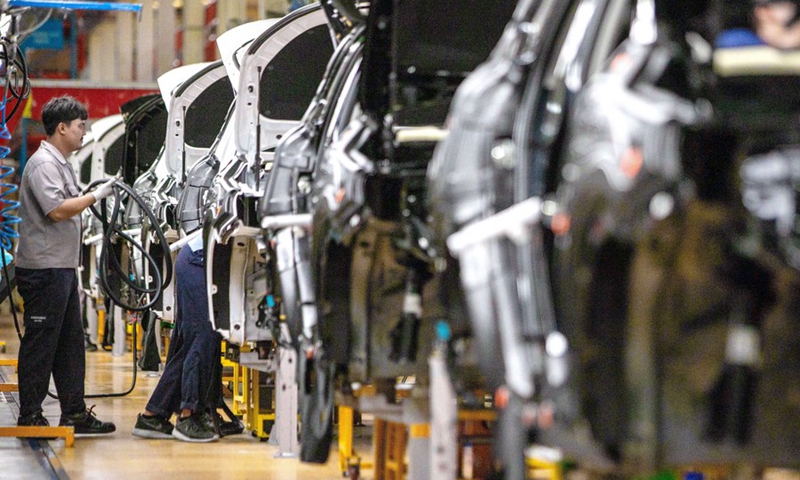
Workers work at the SAIC Motor-CP manufacturing plant in Chonburi, Thailand, Sept. 7, 2023. Photo: Xinhua
China will remove all restrictions on foreign investment in the manufacturing sector, China's top leader said on Wednesday, the Xinhua News Agency reported.
The removal of all restrictions came as a means for China to support an open world economy, one of the eight major steps to support high-quality Belt and Road Initiative (BRI) cooperation.
Experts said that the move further showcases China's determination in continuously promoting high-quality opening-up with concrete measures, which will also bolster the development of the nation's manufacturing sector.
Amid the US and some Western countries hyping the so-called decoupling from China and claiming that foreign enterprises are not treated fairly in China, observers said that China has always welcomed high-quality foreign investment, while the US itself is actually practicing decoupling to restrain businesses from benefiting from the vast Chinese market.
The removal of the restriction demonstrates China's openness in the manufacturing sector, Hu Qimu, a deputy secretary-general of the digital-real economies integration Forum 50, told the Global Times on Wednesday.
Hu added that China's competitiveness in the manufacturing sector remains strong on an international scale, and is capable of handling the full opening of the market.
Li Chang'an, a professor at the Academy of China Open Economy Studies of the University of International Business and Economics, said that the move also demonstrates China's confidence in the manufacturing sector, which has retained a leading role globally.
China's manufacturing added value in 2022 accounted for nearly 30 percent of the global total, and the scale of its manufacturing industry ranked first in the world for the 13th consecutive year, according to official statistics from the Ministry of Industry and Information Technology.
Analysts meanwhile said that the full opening will be conducive to elevate the progress of China's manufacturing sector, amid its already developed strong international competitiveness.
For instance, Hu said that technology spillovers and exchanges of personnel will help strengthen China's development in the sector, especially for high-end industries, as more foreign enterprises are expected to step up cooperation with China.
Li agreed, adding that more foreign enterprises coming into China will help create a better business environment for manufacturing enterprises and help establish a better environment for fair competition.
China has always stuck to promoting high-quality opening-up with solid measures and progress.
The nation revised the negative list for foreign investment access for five consecutive years, starting in 2017. The 2021 version of the list further reduced the number of items restricted from foreign investment to 31, and the version targeting the nation's pilot free trade zones shortened the number to 27, yicai.com reported on Wednesday.
Industry-wise, the 2021 nationwide negative list removed basically all restrictions with only two remaining. The 2021 free trade zone negative list for foreign investment already removed all restrictions for the manufacturing sector, according to media reports.
He Yadong, a spokesperson for the Ministry of Commerce, said earlier in October that the ministry will continue rationally shortening the negative list for foreign investment access, while studying the feasibility of further removing or relaxing the restrictions on the ratio of foreign shares to attract more global elements to enter the Chinese market.
In 2022, foreign investment inflows continued growing with the actual use of foreign investment recording a year-on-year increase of 4.5 percent to $189.13 billion, exceeding 1.2 trillion yuan for the first time in yuan terms.




